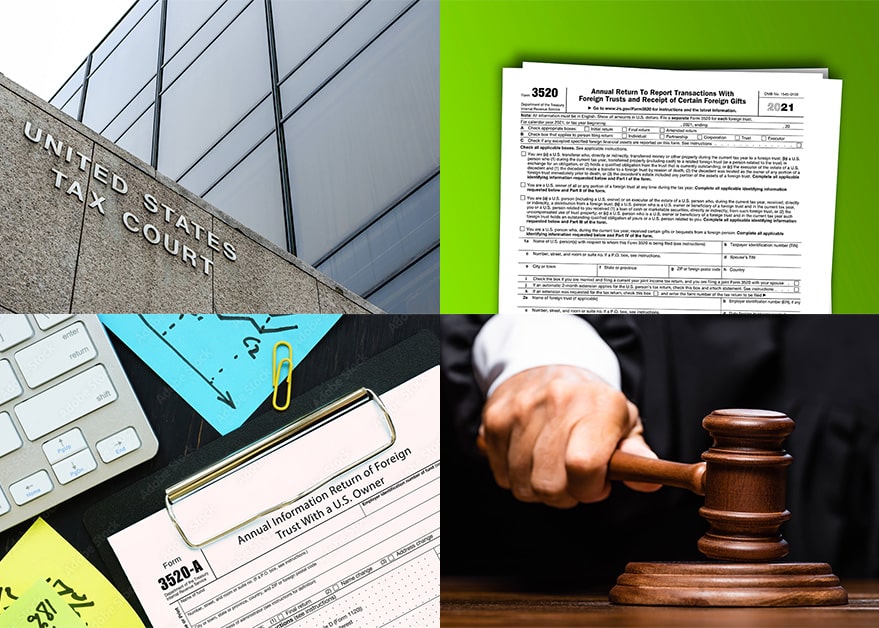Tax Court Rejects Excessive Fines Clause Argument and Upholds $11 Million Form 3520 and Form 3520-A Penalties
The Mukhi v Commissioner[1] case is another example of just how severe the penalties are for failing to report certain foreign financial activity timely; in this case, it was the failure to report foreign trusts, related trust activity, and ownership of a foreign corporation on Form 3520, Form 3520-A, and Form 5471 in a timely manner. In Mukhi, the IRS is attempting to collect Form 3520 and Form 3520-A failure-to-file penalties totaling approximately $11 million, and Form 5471 failure-to-file penalties of $120,000.
The case also demonstrates how complex fighting these penalties can be. The taxpayer in Mukhi v Commissioner is challenging the penalties in both U.S. Tax Court and U.S. Federal District Court. To date, the arguments emphasized in each venue have been somewhat different.
On April 8, 2024, the U.S. Tax Court rejected the taxpayer’s argument that the penalties violated the Excessive Fines Clause of the U.S. Constitution and upheld the massive Form 3520 and Form 3520-A penalties. In a relatively minor victory, the Tax Court followed its holding in Farhy v. Commissioner, 160 T.C. No. 6 (April 3, 20230) and held that the IRS lacked authority to assess the Form 5471 penalties.
As a result, the taxpayer will have to continue his fight against the Form 3520 and Form 3520-A penalties in U.S. district court. Since Farhy is on appeal to the U.S. Court of Appeals for the D.C. Circuit, the IRS may also appeal the Tax Court’s Form 5471 holding in Mukhi as well.
Background
According to the IRS’s Form 3520 penalty lead sheets, the taxpayer is a U.S. citizen who owns a business that manufactures and sells uniforms overseas.[2] “Throughout 2001 and [through] 2010, Mr. Mukhi established relationships with foreign and domestic companies to create a network of companies, trusts, and bank accounts.”[3] The Tax Court recapped the IRS’s allegations, which the taxpayer disputes:
“Between November 2001 and September 2005 petitioner created three entities: Sukhmani Partners II Ltd., a foreign corporation for U.S. tax purposes; Sukhmani Gurkukh Nivas Foundation, a foreign trust for U.S. tax purposes; and Gurdas International Ltd., a foreign trust for U.S. tax purposes. Through these entities, petitioner opened several foreign brokerage accounts. From 2005 through 2007 petitioner personally and through foreign entities transferred at least $9,729,249 to Gurdas International Ltd. From 2006 through 2008 petitioner withdrew at least $4,763,464 from Gurdas International Ltd.”[4]
After an investigation by IRS Criminal Investigations, the U.S. Department of Justice indicted the taxpayer on six charges: “two counts of subscribing to false U.S. individual income tax returns and four counts of willful failure to file reports of foreign bank and financial accounts (FBAR)”. Ultimately, the taxpayer pleaded guilty to two of the charges and agreed to pay the IRS restitution of $37,447.[5]
Subsequently, the IRS initiated a civil examination. During the IRS civil examination, the IRS sent the taxpayer Letter 3804, which demanded that the taxpayer file Forms 3520 and 3520-A for tax years 2005-2013.[6] The taxpayer did not believe that he was required to file the returns. Nevertheless, he filed them “under protest” to avoid continuation penalties.
On September 6, 2017, at the conclusion of the examination, the IRS assessed penalties for failure to file Forms 3520 and Forms 3520-A for the years 2005 through 2010:

The Gross Reportable Amount for Form 3520 totals the alleged contributions to and distributions from the foreign trust. The Gross Reportable Amount for Form 3520-A relates to the total of the alleged value of the assets in the foreign trust for each year in question.
The amount of the deficiency was not discussed in Tax Court case or the refund suit.
IRS Collections Case
After asserting the penalties, the taxpayer submitted a timely protest with the IRS Office of Appeals. Since the case involved an international penalty, the case was assigned to an appeals officer (AO) in the Appeals Office, Area 11 (International Operations).
While the appeal was pending, the IRS began its collections process and ultimately sent the taxpayer a final notice of intent to levy, which carried collection due process (“CDP”) hearing rights. The taxpayer exercised these rights.
Since the taxpayer had not received an Appeals hearing on the underlying liability before the CDP hearing, the underlying liability was also up for consideration in the CDP hearing.[7] As a result, the CDP hearing process dragged on for several years while international unit reviewed the case and reached a conclusion. Due to various personnel issues, the CDP hearing had three separate IRS settlement officers from the beginning of the CDP hearing process until a determination letter was issued.
After receiving a recommendation from the appeals officer in International Operations, the IRS settlement officer rejected the taxpayer’s substantive challenges.
The taxpayer also submitted several collection alternatives, including two offers in compromise. However, the taxpayer and the IRS could not agree on the taxpayer’s reasonable collection potential (RCP).[8] Therefore, the CDP hearing officer sustained the levy determination because they could not agree on a collection alternative.
The taxpayer petitioned the U.S. Tax Court to review the notice of determination issued by the CDP settlement officer.
Refund Suit in Federal District Court
On April 2, 2020, the taxpayer paid a portion of the penalties for each period and fully paid the penalties for 2009 Form 3520-A.

Simultaneously, the taxpayer filed a Form 843, Claim for Refund and Request for Abatement. The IRS did not respond to the request for refund, so after waiting the requisite 6 months, the taxpayer filed a refund suit in the United States District Court for the Eastern District Of Missouri in March 2022.[9]
In the District Court case, the taxpayer contends that:
“(1) the Government failed to meet its burden to demonstrate that the Sukhmani Gurkukh Nivas Foundation is a Foreign Trust; (2) the Government’s assertion of Form 3520 and 3520-A penalties is inconsistent with its position in a prior proceeding; (3) the alleged penalties violate Plaintiff’s rights under the Fifth and Eighth Amendments to the Constitution of the United States; (4) to the extent Plaintiff was required to file Forms Form 3520 and 3520-A for the relevant tax years, reasonable cause exists to excuse Plaintiff’s non-filing; and (5) the penalty amounts, if penalties are valid, were improperly calculated.”
Initially, the IRS and the taxpayer sparred over the procedure, specifically whether the case should proceed or be dismissed due to the pending U.S. Tax Court case. Ultimately, the parties and the District Court judge agreed to stay all litigation and proceedings until the US Tax Court reached its final decision.[10]
Mukhi’s Arguments and Tax Court Decision.
Tax Court Followed Its Holding in Farhy
While the Mukhi cases were pending, the U.S. Tax Court issued its opinion in Farhy v. Commissioner, 160 T.C. No. 6 (April 3, 2023).[11] In Farhy, the U.S. Tax Court determined that, while the relevant Internal Revenue Code section (§ 6038(b)) provides for penalties, the Code provision does not provide the IRS with the authorities to “assess” the penalties related to the non/late filing of Form 5471.[12] As a result, the Tax Court held that the IRS may not proceed with collection of the Form 5471 penalties from the taxpayer via the proposed levy.
If the IRS does not have the authority to assess the penalty, then the U.S. Justice Department would have to obtain a judgment in federal district court to before attempting to enforce collection on the penalties.
The Farhy case is currently on appeal to the U.S. Circuit Court for the D.C. Circuit.[13]
In Mukhi, the Tax Court followed its decision in Farhy and held that the IRS lacked authority to assess the penalties for the failure to file Form 5471 under I.R.C. § 6038(b). Therefore, the Courft held that the IRS cannot proceed with collection actions as they relate to the penalties for failure to file Form 5471.
However, this holding does not extend to § 6677 penalties, which do provide the IRS with authority to assess the penalties for failure to file Form 3520 and Form 3520-A.
Taxpayer’s Arguments Against Form 3520 and Form 3520-A Penalties in U.S. Tax Court
With respect to the penalties related to Form 3520 and Form 3520-A, the taxpayer made several arguments.
First, the taxpayer argued that the penalties violated the Eighth Amendment’s Excessive Fines Clause. Second, the taxpayer argued that an Appeals employee involved in his CDP hearing was not independent, which deprived of the taxpayer of due process under the Fifth Amendment. Third, the taxpayer argued that Tax Court should remand the case for an additional hearing because the Settlement Officer abused his discretion in rejecting the taxpayer’s proposed collection alternatives.
As discussed below, the Tax Court rejected each of these arguments.
Excessive Fines
The taxpayer argued that the penalties under § 6038(b) (failure to file Form 5471) and penalties under § 6677 (failure to timely report trust information on Form 3520[14] and Form 3520-A) violate the Excessive Fines Clause of the Eighth Amendment to the U.S. Constitution.
In making this argument, the taxpayer asked the Court to depart from its prior precedent and for a novel law application of the law. There are no known cases in which a court has held that the § 6677 penalties violate the Excessive Fines Clause. Yet, there are a number of cases that have held that civil penalties under Title 26 (i.e., the Internal Revenue Code) are not “fines” and, therefore, not subject to the Excessive Fines Clause proscription against excessive fines. The Court was reluctant to treat the penalties under § 6677 any differently.
The Tax Court summarized the framework for the Excess Fines Argument:
The Eighth Amendment to the Constitution provides: “Excessive bail shall not be required, nor excessive fines imposed, nor cruel and unusual punishments inflicted.” The Excessive Fines Clause “limits the government’s power to extract payments, whether in cash or in kind, ‘as punishment for some offense.’” Austin v. United States, 509 U.S. 602, 609–10 (1993) (quoting Browning-Ferris Indus. of Vt., Inc. v. Kelco Disposal, Inc., 492 U.S. 257, 265 (1989)). The touchstone of whether a fine violates the Excessive Fines Clause is the “principle of proportionality: The amount of the forfeiture must bear some relationship to the gravity of the offense that it is designed to punish.” United States v. Bajakajian, 524 U.S. 321, 334 (1998). Therefore, we must first determine whether the section 6677 penalties are fines and then if they are fines, whether they are excessive.
In order to determine if the penalties are “fines” in this context, the next step in the Tax Court’s inquiry was to examine whether the penalty serves the purpose of punishing the offense or if the penalty is remedial in nature. If the penalty is a form of punishment, then it is a fine and subject to further analysis regarding whether it is excessive or not. On the other hand, if the penalty is remedial in nature, then the penalty is not a fine and the the penalty is not subject to limitation under the Excessive Fines Clause.
A penalty is said to be remedial in nature if the penalty is “provided primarily as a safeguard for the protection of the revenue and to reimburse the Government for the heavy expense of investigation and the loss resulting from the taxpayer’s fraud” or other conduct.[15] The Tax Court cited a string of cases in which it had previously and consistently found that the purpose of civil tax penalties and additions to tax is to encourage voluntary compliance, and therefore they are not punitive.[16]
The Court also cited other cases in which other courts have found that the penalties under penalties under sections 6038(b) and 6677 serve a remedial purpose and are not fines.[17]
Finally, the Court also noted that the U.S. Court of Appeals for the First Circuit has “found that penalties related to failure to file an FBAR with the IRS are not fines”.[18]
Given this existing precedent, the Tax Court was not persuaded that the penalties were punitive in nature. Therefore, the Tax Court held that the penalties are not fines subject to the Excess Fines Clause.
Nevertheless, the Tax Court went on to state that, even if the penalties were “fines”, they were not excessive for purposes of the Excess Fines Clause. The Tax Court explained that:
To pass the constitutional proportionality inquiry under the Excessive Fines Clause, the amount of the forfeiture or fine must bear some relationship to the gravity of the offense that it is designed to punish. See Bajakajian, 524 U.S. at 334. A fine violates the Excessive Fines Clause if “the amount of the forfeiture is grossly disproportional to the gravity of the defendant’s offense.” Id. at 337.[19]
Here again, the Tax Court cited prior precedent holding that “similar penalties are not disproportionate to the fraud on the government and harm caused on the public fisc.”[20] The Tax Court opinion did not discuss or analyze of the general harm caused by the “fraud on the government and the harm caused on the public fisc” nor did the opinion discuss the specific harm based upon the case at hand. In fact, the Tax Court opinion did not discuss or state the taxpayer’s deficiency from the related conduct.[21]
It is notable that two of the three cases cited were related to accuracy related penalties on understatements of tax and the third case dealt with FBAR penalties under Title 31, Money and Finance rather than Title 26, Internal Revenue Code. Generally, the potentially massive Form 3520 and Form 3520-A penalties bear no direct relationship to an understatement of tax. In my opinion, this often causes the penalties to be excessively harsh when the IRS takes an exceptionally myopic view of what constitutes “reasonable cause”.
Could a More Sympathetic Taxpayer Cause a More Difficult Decision on The Excess Fines Argument?
In this case, the underlying offshore legal entity structure would have been inherently hard for the IRS to detect and examine. The IRS began an investigation into the taxpayer’s conduct after taxpayer’s foreign bank provided information to the U.S. government. Thus, it is probably true that the IRS had an increased cost of uncovering and enforcing tax laws against the taxpayer in this case. Therefore, it is easy to conclude that such penalties could be viewed as compensation for the IRS’s increased burden with respect to this case.
However, this conclusion does not necessarily apply to all taxpayers who are subject to Form 3520 and Form 3520-A penalties.
Although the taxpayer in Mukhi also plead guilty to criminal tax crimes, the penalties for failure to file Form 3520 and Form 3520-A are not predicated on a finding of fraud or intent to evade. Instead, any taxpayer, including an ignorant or ill-advised taxpayer, may be subject to the Form 3520 and Form 3520-A penalties if they merely file the forms late.
Furthermore, the penalties are not tied to tax loss. Although the taxpayer in Mukhi did have a tax deficiency related to his offshore activities that were required to be reported on Form 3520 and Form 3520-A, the penalties are not tied to a tax deficiency (i.e., an underpayment of tax).
In this regard, it is unsurprising that the Court would not be hard-pressed to diverge from existing precedent. However, it will be interesting to see if a more sympathetic taxpayer subject to such penalties can cause a court to reexamine the prudence of its determination as to whether § 6677 is necessarily remedial and not punitive in nature.
Challenge to IRS Settlement Officer’s Independence
The taxpayer also made a procedural challenge to the IRS’s settlement officer’s determination at the conclusion of the collection due process hearing. This challenge was to the final IRS settlement officer’s independence, but it was not a challenge to the taxpayer’s underlying tax liability.
In Mukhi, the taxpayer had three different IRS settlement officers during the course of his CDP “hearing”. The first settlement officer was assigned in June 2019 and issued Letter 4837, Appeals Received Your Request for Collection Due Process Hearing, confirming the receipt of petitioner’s CDP hearing request. The letter also scheduled a telephone conference for July 2019. However, the third (and final) settlement officer did not issue a notice of determination until February 2022.
CDP hearings are usually conducted by an IRS appeals officer who is assigned to work collection-related cases. However, if a taxpayer can challenge his underlying liability in a CDP hearing, then the settlement officer can and is often required to transfer the case to another appeals officer to review the case and the taxpayer’s arguments. If a case involves international penalties and the underlying liability is subject to review (i.e., the taxpayer did not have a prior opportunity to dispute the liability), then the case is usually referred to international operations.
Unfortunately, when it comes to international information reporting penalties, the issues are all coordinated through one or two IRS employees. In my opinion, these individuals tend to have a very narrow and restrictive view of what taxpayer conduct constitutes grounds for abatement under “reasonable cause”. Therefore, taxpayers facing international penalties must work diligently to assemble a strong narrative and legal argument on a year-by-year basis to obtain abatement through reasonable cause, including reasonable reliance on a preparer.
In Mukhi, an IRS appeals officer from the International Operations division was assigned to the case to review and research the taxpayer’s challenges to the liabilities. The appeals officer reached his decision on May 9, 2019 and issued two Letters 1277, Penalty Appeal Decision. These letters stated that IRS could not abate the penalty because there were no grounds for abatement. The letters also stated that the taxpayer’s case with the Appeals Office was closed. These letters were forwarded to the settlement officer.
In the procedural challenge, the taxpayer argued that the IRS violated his Fifth Amendment right to due process due by the third settlement officer’s prior involvement in the case.
Sections 6320(b)(3) and 6330(b)(3) provide that a CDP hearing “shall be conducted by an officer or employee who has had no prior involvement with respect to the unpaid tax specified . . . before the first hearing.” The Code does not define “no prior involvement.” See Harrell v. Commissioner, T.C. Memo. 2003-271, slip op. at 16, supplemented by T.C. Memo. 2003-312. However, the regulations provide that prior involvement includes “participation or involvement in a matter (other than a CDP hearing held under either section 6320 or section 6330) that the taxpayer may have had with respect to the tax and tax period shown 13 on the CDP notice.” See Treas. Reg. §§ 301.6320-1(d)(2), Q&A-D4, 301.6330-1(d)(2), Q&A-D4.
The Court noted that:
“the parties dispute whether AO’s communication with SO3 during the CDP hearing violated sections 6320(b)(3) and 6330(b)(3). AO clearly had prior involvement in the dispute of the foreign reporting penalties via his participation in the postassessment conference. AO was the Appeals officer assigned to petitioner’s postassessment conference and rendered the final decision not to abate the foreign reporting penalties. We must determine whether AO is deemed to have “conducted” the CDP hearing as contemplated by sections 6320(b)(3) and 6330(b)(3).”
The Tax Court rejected this argument because the appeals officer’s communications did not arise to the level of “conducting” the CDP hearing.
In my experience, the Settlement Officer generally accepts the Appeals Officer’s analysis and does not conduct a robust independent research and analysis. As a result, it is difficult to escape the harsh results often imposed by the international penalty appeals coordinator(s).
Outstanding Arguments in Federal District Court
The Tax Court case was predicated on a review of a notice of determination issued by the IRS settlement officer at the conclusion of the CDP hearing. In contrast, the case in the US Federal District Court is predicated on a demand for a refund after the IRS denied the taxpayer’s administrative refund claim.
In addition, the Department of Justice has argued, and the District Court has not ruled, on whether it had jurisdiction over all of the tax years in question because the taxpayer did not fully pay all of the Form 3520 and Form 3520-A penalties.
As mentioned above, the District Court determined to stay all litigation and proceedings until the Tax Court reached a final determination. Before moving on to the merits, the District Court will have to determine whether any and all claims are properly before the court. In addition, it remains to be seen what preclusive effect, if any, the Tax Court’s opinion will have on the Federal District Court case.
The Tax Court opinion did not analyze and reach a determination on some of the arguments raised during the initial stages of the Federal District Court proceedings. Therefore, even if the taxpayer is precluded from litigating the Excess Fines Clause issue and deprivation of due process, the taxpayer will likely raise these other arguments that were not directly addressed in the Tax Court’s opinion. Assuming that the taxpayer is able to proceed, these are some of the arguments raised previously in the taxpayer’s administrative claim:
1. IRS Cannot Carry Its Burden that Taxpayer Was Required to File Each of the Forms
As noted above, the taxpayer alleges that, despite filing Forms 3520 and Form 3520-A under protest, the U.S. cannot legally prove that the taxpayer was legally obligated to file the forms.[22] Here, the taxpayer is alleging that the U.S. does not have direct proof of the taxpayer’s ownership of the entities in question.
2. Inconsistency Defense[23]
This argument is predicated on the notion that, in the criminal prosecution, the Department of Justice argued that the legal entities were a sham and that they should be disregarded (i.e., any income earned by the foreign trust structure were actually the taxpayer’s earnings for federal income tax purposes). The taxpayer wants to preclude the Department of Justice from changing tacks and arguing in the civil proceedings that the entities were not shams (i.e., the entities were recognized for federal tax purposes and therefore the taxpayer had a legal obligation to file the Forms 3520 and Forms 3520-A).
3. Reasonable Cause
Even assuming that the taxpayer did have an obligation to file Forms 3520 and Form 3520-A, the taxpayer argues that his failure to file the form is excused by reasonable cause.
Under § 6677(d):
No penalty shall be imposed by this section on any failure which is shown to be due to reasonable cause and not due to willful neglect. The fact that a foreign jurisdiction would impose a civil or criminal penalty on the taxpayer (or any other person) for disclosing the required information is not reasonable cause.
Reasonable cause is a facts and circumstances test.
Generally, ignorance of the law may provide reasonable cause, but the IRS is not quick to grant relief based upon pleas of ignorance.[24] In some cases, actual ignorance is not enough to escape penalties because the taxpayer is burdened by construction knowledge.[25]
In the taxpayer’s refund claims, he argued that he did not know that he was required to file Forms 3520 and Forms 3520-A. The refund claim states that the first time that he heard of Form 3520 and Form 3520-A filing obligations for the entities in question was in 2016 during the IRS civil examination.
4. Penalties were Inaccurately Calculated
In this argument the taxpayer is making a technical argument that some of the contributions were not made by the taxpayer and should therefore not be part of the penalty base. In addition, the taxpayer asserts that the IRS has not proven that the taxpayer actually received the distributions in the penalty base. Furthermore, he argues that any funds that were received were not “distributions” for purposes of the penalty computations.
The IRS rejected these arguments. It will be interesting to see if the District Court finds any merit in them.
What is clear is that it will be interesting to see the case unfold since there are so few cases that litigate Form 3520 and Form 3520-A penalties.
Concluding Thoughts
The Tax Court’s decision in Mukhi is somewhat unremarkable since it does not break new legal ground. Given the magnitude of the penalties and the IRS’s lack of reasonableness in abating penalties for reasonable cause, it is always good when there is a taxpayer victory to fight back against massive penalties. Therefore, it is good to see that the Tax Court followed its decision in Farhy to deny the collection of the Form 5471 penalties.
However, the Tax Court unsurprisingly did not seem to break a sweat in rejecting the taxpayer’s Excessive Fines arguments. Hopefully, a more sympathetic taxpayer can attempt to push the Tax Court to reconsider its holding that Form 3520 and Form 3520-A are remedial in nature and not subject to the Excessive Fines Clause.
Finally, given the small sample size of cases analyzing Form 3520 and Form 3520-A penalties, it will be interesting to see how the taxpayer’s other arguments are analyzed by the District Court.
Notes
[1] Mukhi v Commissioner, 162 T.C. No. 8, (April 9, 2024). Text of the Tax Court’s opinion can be found here: Google Scholar.
[2] See Mukhi v U.S., 4:22-cv-00280-MTS , Doc 1-2, Page 11.
[3] Id.
[4] Mukhi v Commissioner, 162 T.C. No. 8, at 3.
[5] U.S. v Mukhi, 4:14-cr-00173-AGF, Doc. #61 filed on 1/16/2015, Page 4.
[6] Letter 3804 notifies the taxpayer that the IRS is charging an “initial penalty.” If the taxpayer does not respond within 90 days from the date of the letter, then the IRS can charge a “continuation” penalty. See IRC § 6677, Failure to file information with respect to certain foreign trusts.
[7] A taxpayer can challenge an underlying liability in a CDP hearing if the taxpayer has not had a “prior opportunity” to dispute the liability. See IRM 8.22.8.3 (08-26-2020) When Liability is Raised.
“(9) Examples of “not a prior opportunity” to dispute the tax liability are:
…
- A separate Appeals conference held concurrently with the CDP hearing.”
[8] The Tax Court opinion notes that the taxpayer calculated his RCP between $1.0 million and $2.67 million; each of the taxpayer’s offers also offered to withdraw his refund lawsuits. On the other hand, the IRS’s OIC unit specialist determined that the taxpayer’s RCP was $4.26 million.
[9] Mukhi v. United States, 4:22-cv-00280 (E.D. Mo. filed on March 8, 2022). For more, you can find information on the case here: Docket on Court Listener.
[10] Mukhi v. United States, 4:22-cv-00280, Dkt. no. 20 (Initial stay order issued on Dec. 20, 2022). The initial stay has been extended several times with the exception that that parties were required to file briefs on the impact of the Tax Court’s Farhy decision on the taxpayer’s case.
[11] Text of the Tax Court’s Farhy opinion is available here: Google Scholar
[12] The Internal Revenue Code provides the Secretary of the Treasury with the authority to make “assessments” of all taxes (including interest, additional amounts, additions to tax, and assessable penalties). Once a tax is assessed, then it become a tax debt that the IRS can collect via its special collection powers (i.e., lien and levy). The Farhy case boils down to whether or not the IRC, specifically § 6038(b), actually provided the Secretary of Treasury with the authority to assess the Form 5471. The Tax Court determined that § 6038(b) does not provide such authority.
[13] Farhy v. Commissioner , No. 23-1179 (D.C. Cir. filed July 24, 2024). For more information see: Docket on Court Listener.
[14] Note that penalties for failure to report large foreign gifts on Form 3520 are rooted in a separate code section (§ 6039F) and are not discussed in this case.
[15] Helvering v. Mitchell, 303 U.S. 391, 401 (1938).
[16] See Thompson v. Commissioner, 148 T.C. 59, 66 (holding that the civil fraud penalty under section 6662A is not punitive); Ianniello v. Commissioner, 98 T.C. 165, 187 (holding that the addition to tax under section 6653 is not punitive); Bell Cap. Mgmt., Inc. v. Commissioner, T.C. Memo. 2021-74, at *18 (holding that the civil fraud penalty under section 6663(a) is not punitive); Gorra v. Commissioner, T.C. Memo. 2013-254, at *63–64 (holding that gross valuation misstatement penalty under section 6662 is not punitive); Mason v. Commissioner, T.C. Memo. 2001-58, slip op. at 8 (holding that additions to tax under section 6651(a)(1) and (2) are not punitive
[17] Mukhi at 20 (“Dewees v. United States, 272 F. Supp. 3d 96, 100–01 (D.D.C. 2017) (holding that penalties under section 6038(b) are not fines), aff’d, 767 F. App’x 4 (D.C. Cir. 2019); In re Wyly, 552 B.R. 338, 613 (Bankr. N.D. Tex. 2016) (determining that penalties under sections 6038(b) and 6677 are not fines)”).
[18] United States v. Toth, 33 F.4th 1, 19 (1st Cir. 2022).
[19] Mukhi at 21.
[20] Muki at 21 (citing Thompson, 148 T.C. at 67–68; Gorra, T.C. Memo. 2013-254, at *62–63; United States v. Bussell, 699 F. App’x 695, 696 (9th Cir. 2017).
[21] In Mukhi’s criminal tax case, he plead guilty and agreed to pay $37,447 in restitution to the IRS. This amount alone hardly seems proportional to the Form 3520 and Form 3520-A penalties. From the penalty lead sheets, the IRS alleged that the taxpayer had approximately $2 million of unreported Subpart F income from tax years 2003 through 2010. However, it is unclear what the deficiency from this underreporting created. Most importantly, the taxpayer disputes the IRS’s “recitation of facts underlying the penalty assessments.” Mukhi v U.S., 4:22-cv-00280-MTS, Doc. 16, footnote 1 (E.D. Mo. filed 10/11/22).
[22] Presumably, the taxpayer will argue that the filings under protest should not constitute an admission or direct evidence of ownership under the federal rules of evidence.
[23] The Tax Court opinion noted that the taxpayer “vaguely asserted” this argument in passing in one of his briefs, but it was not expanded on in the final motions. The Tax Court opinion notes that the plea agreement specifically stated that it did not limit the rights of the Government to pursue civil action against the taxpayer.
[24] See James v. U.S., No. 8-11-cv-271-T-30AEP (M.D. Fla. August 14, 2012)( quoting the IRS Internal Revenue Manual).
[25] For example, in the context of willful FBAR penalties, the IRS has been very successful at enforcing willful FBAR penalties based upon constructive knowledge through the presence of a Schedule B (i.e., with the yes or no questions regarding foreign bank accounts) and signing of the Form 1040, which provides: “Under penalties of perjury, I declare that I have examined this return and accompanying schedules and statements, and to the best of my knowledge and belief, they are true, correct, and complete.”






